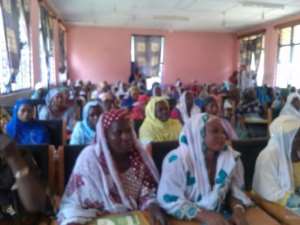
A lecturer at the Department of Food Science and Technology at the Kwame Nkrumah University of Science and Technology (KNUST) has cautioned Ghanaians to be wary of eating burnt foods.
Mrs Gloria Ankar-Brewoo says such foods, especially, banku and rice contain cancer causing toxins which are deadly to human health.
She has also cautioned against the use of burnt oil for cooking as well as the use of polythene bags to cover food on fire.
Speaking at a 3-day training program for food vendors in Tamale on Street Food Regulation, Food Safety and Business Management, organised by the Ghana Streets Foods Project, Mrs Ankar-Brewoo said foods that burn during cooking produce some polycyline aromatic hydrocarbons with the most potent caseinogens being benzo [a] pyrene and dibenzo ah anthracene which makes the food unsafe for human consumption.
According to Mrs Gloria Ankar-Brewoo people should learn to cook with low heat so that they can have their food well cooked and safe.
She also expressed worry about how vegetables are handled by food vendors, stating, most of them do not treat the vegetable well before selling it.
She said some of the vendors, in some cases, just harvest the vegetables right from the farms with the deadly bacteria for people to consume.
As a testament of how dangerous the vegetables could be if not treated well, she revealed that bacteria in vegetables, ecoline, multiply every 20 seconds, while the other bacteria multiply in every 30 minutes.
Mrs Ankar-Brewoo stressed that foods cooked after 6 hours are unsafe for consumption and urged food vendors to cook their meals in smaller quantities at a time.
Lecturer, Department of Agricultural Economics Agribusiness and Extension KNUST, Dr. James Osei Mensah said food vendors are very important in all spheres of life because they provide a source of livelihood for most women, food for urban dwellers and a means of employment for most people who ordinarily would not be employed.
He therefore reiterated the need for capacity building for such vendors.

Chronicling some of the challenges vendors face, Dr Osei Mensah said the project identified that most of the vendors did not know how to manage their resources, handle customers, safety, hygiene and could not keep accurate record.
He said the workshop was to announce the findings for their project and also to review areas that need to be looked at.
He noted there were gaps between the food vendors and their regulators and in some cases ordinary people impersonating regulators and cheating the vendors.
Dr. Osei Mensah said these workshops would help the women network and be exposed to numerous ways of confront some of these challenges the face from time-to-time
The project is a three year project funded by the Danish Aid Agency (DANIDA) to enhance the capacity of food vendors who form a core sector of the Ghanaian economy.




 Akufo-Addo commissions Phase II of Kaleo solar power plant
Akufo-Addo commissions Phase II of Kaleo solar power plant
 NDC panics over Bawumia’s visit to Pope Francis
NDC panics over Bawumia’s visit to Pope Francis
 EC blasts Mahama over “false” claims on recruitment of Returning Officers
EC blasts Mahama over “false” claims on recruitment of Returning Officers
 Lands Minister gives ultimatum to Future Global Resources to revamp Prestea/Bogo...
Lands Minister gives ultimatum to Future Global Resources to revamp Prestea/Bogo...
 Wa Naa appeals to Akufo-Addo to audit state lands in Wa
Wa Naa appeals to Akufo-Addo to audit state lands in Wa
 Prof Opoku-Agyemang misunderstood Bawumia’s ‘driver mate’ analogy – Miracles Abo...
Prof Opoku-Agyemang misunderstood Bawumia’s ‘driver mate’ analogy – Miracles Abo...
 EU confident Ghana will not sign Anti-LGBTQI Bill
EU confident Ghana will not sign Anti-LGBTQI Bill
 Suspend implementation of Planting for Food and Jobs for 2024 - Stakeholders
Suspend implementation of Planting for Food and Jobs for 2024 - Stakeholders
 Tema West Municipal Assembly gets Ghana's First Female Aircraft Marshaller as ne...
Tema West Municipal Assembly gets Ghana's First Female Aircraft Marshaller as ne...
 Dumsor is affecting us double, release timetable – Disability Federation to ECG
Dumsor is affecting us double, release timetable – Disability Federation to ECG
